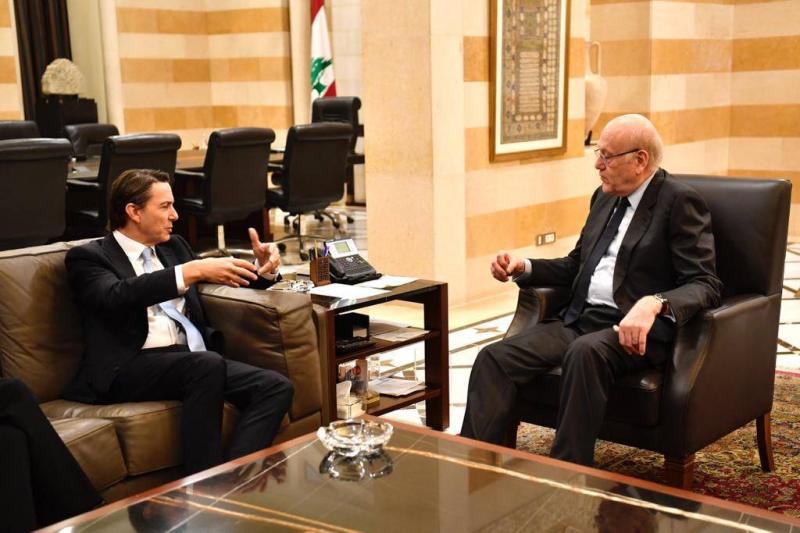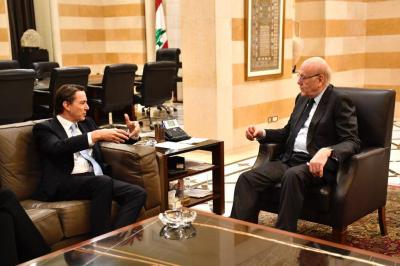The U.S. Energy Security official, Amos Hochstein, President Joe Biden's envoy to Lebanon, did not rule out the possibility of diplomatic solutions. He diplomatically insisted that the outbreak of war in Lebanon cannot be controlled or stopped. However, the mediator, who spent five hours with a carefully planned schedule of meetings involving U.S. Ambassador to Beirut Liz Johnson, seemed very cautious about his diplomatic mission, which is linked to the situation in Gaza. He found that the attempts at separation through meetings, incentives, promises of electricity, gas extraction, and the recovery of disputed points with Israel from the 2006 war appeared difficult or even impossible.
He departed in the evening after meetings which extended to include Christian opposition MPs, responding to calculations concerning internal balances and the electoral considerations for presidential candidate Joe Biden’s new term. This included a meeting with former MP Walid Jumblatt. The meetings were not limited to the official side; he began with President Nabih Berri, followed by Prime Minister Mikati, and included Army Commander General Joseph Aoun. Reports indicate that Hochstein reminded President Berri of his role in achieving the "maritime understanding" and that he could have a role in land demarcation, starting from point "B1" in Naqoura up to Ghajar, while also addressing the seven points mentioned in Resolution 1701.
Significant political sources summarized U.S. Presidential Advisor Amos Hochstein's mission in Lebanon as aimed at cooling the heated southern front and containing all escalation attempts during the gap between the ceasefire in Gaza and establishing certain agreements on both sides of the southern Lebanese border with Israel, based on the content of UN Security Council Resolution 1701, to prevent any uncontrolled escalation from leading to a large-scale confrontation or war, of which Lebanon would be the primary victim.
The sources described the nature of Hochstein's visit as coming amidst military escalation taking place in the south between Hezbollah and Israel, necessitating his quick return to Lebanon to calm the situation, in line with U.S. policy to prevent the expansion of the Israeli war to other neighboring countries, including Lebanon, and to revive diplomatic communications and consultations to reach agreements or security arrangements on both sides of the border, and moving forward with the efforts to demarcate borders and resolve outstanding issues.
According to sources that met Hochstein, his visit conveyed a renewed emphasis on the importance of a diplomatic solution regarding developments in the south, which is essential and separate from the Gaza truce, as Hochstein did not wish to confirm that the calm on the Gaza front applies to the southern front. It is clear that the U.S. official is attempting to establish a comprehensive diplomatic solution in the south and understood that the opposition MPs reiterated the enforcement of international resolutions and the need to not allow Lebanon to become a war zone.
Some information sources hinted that Hochstein appeared less harsh towards Hezbollah, considering that the party's leadership should look positively towards a permanent solution for a long-standing and sustainable calm along the Blue Line, as a temporary ceasefire is not a solution. Sources from Ain al-Tineh described Hochstein's conveyed perceptions as being more aligned with the reality on the ground.
It was understood from these circles that the Biden administration advised Lebanese parties and continues to do so not to give Benjamin Netanyahu and Minister Yoav Gallant the opportunity to expand the war. In what seemed to be a call to separate the future of stability between Gaza and the south, Hochstein suggested that during the proposed "humanitarian truce" of one and a half months, stability along the southern front should be established, regardless of the course after the truce on the Gaza front.
He also referred to the end of the 2006 war and the necessity of implementing Resolution 1701 by both the Lebanese and Israeli sides, which has not happened. According to the U.S. mediator, this could be brought to the table after the Gaza truce (six weeks). The U.S. official purposely began his current visit from Ain al-Tineh, where he met President Berri, from where he prioritized the diplomatic solution preferred by his administration over any other solution, considering that the Gaza truce and the release of prisoners could also apply to southern Lebanon.
At the Grand Serail, Hochstein updated Prime Minister Mikati on recent developments and his efforts to reach a halt to military operations. Regarding his meeting with the former leader of the Progressive Socialist Party, Walid Jumblatt, Hochstein reiterated his view that Gaza and southern Lebanon are separate paths and different from each other. The description of the meeting varied, being neither negative nor positive, but rather "in between."




